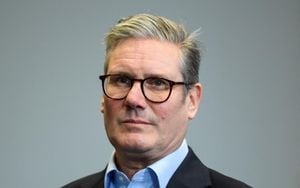With Donald Trump gearing up for another term as president come January 2025, the air is thick with speculation about the potential shake-ups to global trade. Many eyes, especially across the Atlantic, are on the trade relationship between the UK and the US, where business leaders are urging the British government to forge stronger diplomatic ties with the incoming administration.
Historically, the US has been the UK’s largest trading partner, accounting for 18% of all UK trade and 22% of its exports as of 2023. Those numbers are significant, illustrating just how entwined the two economies are. Exports to the US have more than doubled since 2014, climbing from £93 billion to £187 billion – exclusive of gold trades, which tend to skew statistics dramatically.
Stephen Moore, Trump’s economic adviser, did not mince words when he stated recently, “If the UK is ready to adopt the US model of economic freedom, then the door for negotiations on trade will open.” But as encouraging as these remarks might sound, former World Trade Organization chief Pascal Lamy warns against getting too cozy. He believes it’s more beneficial for the UK to align closely with the EU since trade between the UK and Europe is three times as significant as trade with the US.
The warning bells have been sounded from various corners. With the recent UK Budget unveiled by Chancellor of the Exchequer Rachel Reeves, which proposed the largest tax hike seen in three decades, many business leaders expressed their discontent. Two-thirds of executives surveyed felt the measures would inflate operating costs, possibly leading to layoffs and stunted growth. The specter of higher tariffs from Trump only compounds these concerns, with estimates indicating the UK could suffer a staggering £22 billion hit to its exports if Trump were to impose a 20% tariff.
The sentiment among UK business leaders is clear: they want Prime Minister Keir Starmer to act decisively and avoid what could morph from political talk to tangible trade conflict. Amid growing unease, conversations around forging new trade agreements or refreshing existing frameworks have become commonplace among executives.
Despite the pessimism, there are flickers of optimism for some. Kemi Badenoch, the opposition leader, recently wrote a piece challenging Starmer to ramp up talks for a free trade agreement with Washington. Badenoch insists, “If Trump does pursue more protectionist tariffs, it would be terrible news for the UK. Only by securing a free trade deal can we safeguard our interests.” Her remarks echo sentiments held by many who recall the productive discussions during Trump’s first presidency about potential trade agreements.
While fundraising and economic growth are on the horizon, the specter of tariffs looms large. The political wrangling is not limited to the UK, either. Globally, the notion of tariff negotiations is causing ripples. Reports of fears surrounding a potential US-Eurozone trade war have escalated. Analysts predict Trump will pursue the core tariff policies he championed during his campaign, framing the economic story over the next few years or more.
Forward-looking analysis from Capital Economics suggests the US Dollar could gain another 5% by 2025, primarily driven by Trump's anticipated economic policies. Investors and analysts alike are on edge, working to decipher how Trump's return will impact the Federal Reserve’s actions and monetary policy debates.
The upcoming G20 summit in Rio de Janeiro adds another layer of intrigue. Leaders from around the world, including Australian Prime Minister Anthony Albanese and Chinese President Xi Jinping, will convene. Trade, tariffs, and economic strategies will surely top the agenda as nations attempt to navigate through potential trade wars, each party wary of the economic ramifications of sustained tariff hostilities.
Back on the home front, the churning waters of UK trade policies and tariffs are not going unnoticed. Executives and analysts are urging the government to double down on efforts to cultivate discussion and negotiations with the new Trump administration, signaling the stakes for the UK’s economy could not be higher.
“Timing is everything,” reflected one trade analyst. “With Trump returning to power, the time for the UK to assert itself on the global stage is now. They need to reclaim agency over their economic destiny.” The upcoming weeks will unravel whether this wishful thinking translates to substantial action or if trade woes will continue to compound amid uncertainty.
The stakes are certainly at their highest when considering the potential fallout from tariff increases and trade negotiations already marginalized during Trump’s first administration. The urgency to establish clarity on trade policies cannot be overstated, especially when predictions suggest significant disruptions could occur. Navigational skills toward stronger US ties hinge not just on rhetoric but on actionable diplomacy.
Each day's news will bring fresh developments on this front, continually reshaping the narrative of UK-US relations within the global trade arena. So, as the season shifts toward the end of the year, all eyes will be on the interactions, talks, and negotiations, with hopes high for clarity and cooperation for all parties involved. It’s clear: global markets will be feeling the tremors long before the ink dries on any new trade deals.
Trump’s presidency is shaping up to carry the weight of economic philosophies from protectionist stances to acutely active tariff regimes. For both the UK and the US, this could be seen as either jeopardy or opportunity, depending on how well either country navigates this impending storm.
Therefore, as the gears turn on whether Trump’s tariff threats will materialize as reality, the collective global market watches and waits, trepidation palpable as economies launch forward, each set to gauge how the balance of trade is recalibrated once again.



